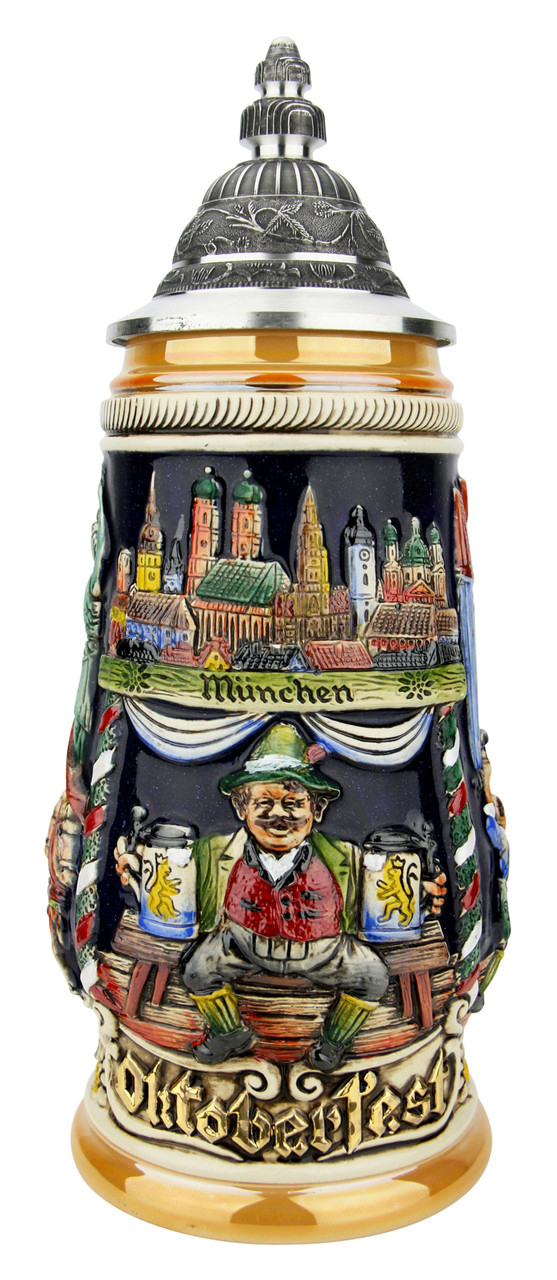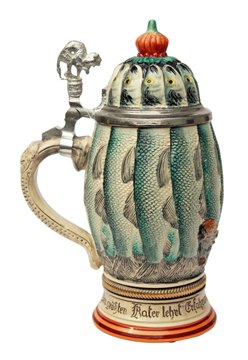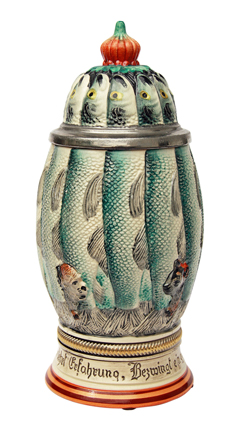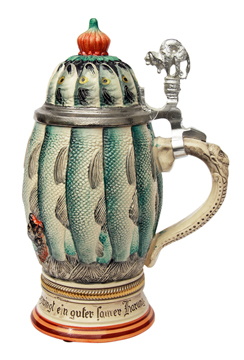A Brief History of German Beer Steins
German Beer Steins were originally produced to combat health issues that triggered the Bubonic Plague. Strict laws enforcing sanitation on the ingredients, transport, and quality of beer led to a vast improvement in the taste of German beer. This in turn placed a higher value and importance on the Beer Stein and made owning your own unique stein a thing of desire.
A Beer Stein became a status symbol and display piece for each German family, emblazoned with a household crest, shield or expression. As the old saying goes: "The German will place great value on that which brings him his food or drink." Likewise we place great care and esteem in bringing you an item which has fascinated collectors since the 13th century, The German Beer Stein.

Every Limited Edition German Beer Stein is individually numbered and stamped with the manufacturer's mark and country of origin, making each Beer Stein unique.
A not-quite-everyday reflection!
From Thewalt GmbH
~German Beer Stein Manfacturer~
What is a Beer Stein?
An authentic German Beer Stein is:
~ a drinking receptacle
~ a souvenir from Old Germany
~ a knickknack
~ a collector's piece
~ a kitsch item
~ an investment
~ an expression of gemuetlichkeit
~ a Bavarian status symbol
Beer steins are popular in Germany, America, Japan, Russia and practically in all other countries as a thoroughly German original product.
Why do people love beer steins?
Beer glasses have long replaced their practical value, but people still love steins. So why?
Is it because of its German origin? The world is not very particular about that any more!
Is it its colorful appearance? That can be enjoyed in many other objects too!
Is it its lid? Perhaps as a practical cover to keep off the flies?
There must be other reasons... maybe:
*Because they are imposing and manly. But so were the drinking horns out of which the ancient Teutons lapped up their mead - a hooch which was neither beer nor wine.
*Because a beer stein is just right to bang on the table (or your opponent's head) without the unpleasant accompaniment of glass splinters.
*Because beer and steins belong together as if by wedlock.
*Because beer is a special beverage with its own image and thus deserves its own receptacle. Can you imagine drinking beer from a wine glass or wine from a beer stein? To us the idea is absurd. However, -how ghastly!- the plastic cup has now become acceptable for both drinks.
But there must be something else which gives the beer stein its timeless appeal...
Just a second, I think I have it! Yes, that's it:
A beer stein has a soul!
You cannot hear it or taste it or see it or feel it - but you know it's there.
And, as the renowned pathologist Virchow said, souls cannot be dissected. Nor can they be explained by the cool, rational thinking of Homo sapiens. Above all, they are immortal - and that seems to be the core of the whole matter.
Thus - in spite of croakers and prophets of evil - the beer stein will live on.
We may not know who invented it but, whoever it was, he deserves a monument!
~ Albert J. Thewalt GmbH
Animal Symbolism on Beer Steins:
Artists have always used symbols to represent things, ideas or emotions in their work. Beer stein artists are no different. Animals, in particular, appear on many steins as the primary subject or are included in the background. Each of these animals have unique depictions and ideas they represent when depicted on beer steins.
Cats
Germans have likened the groans or sounds of discomfort that sometimes come from someone suffering from a hangover to the sound of a wailing cat. Therefore, the word used for being drunk or having a hangover is kater, or “tomcat.” It is also sometimes called katzenjammer, or “cat’s wail.”
Monkeys
The expression “monkey on your back” means to stop a bad habit, or rid yourself of a problem. The symbol of a monkey has come to represent over-indulgence in drinking, perfect for a beer stein.
Herring
Long professed to cure a hangover, herring has become part of the German’s katerfrühstück, or "hangover breakfast." The classic breakfast hangover-cure usually includes marinated herring (rollmops).
This unusual beer stein depicts a cat, monkey and herring.



Foxes
A fox is symbolic for being sly, cunning and conniving.
Lions
Symbolizing courage, valor, strength, bravery and royalty, the lion is often used to represent Bavaria, and its capital, Munich.
Bears
A bear represents strength. It is also used as a symbol for Berlin, the capital of Germany and the country’s largest city.
Pigs
Germans view pigs, or schwein, as a symbol of good fortune and luck, reflected in expressions like schwein haben, which literally translates to “to have a pig,” but means “good luck.” This expression is believed to date back to the Middle Ages, when the loser in a competition was presented with a pig as a consolation prize.
Best Selection of Authentic German Beer Steins Online
GermanSteins.com has the largest selection of authentic beer steins you can buy online. Our wide variety of German Beer Steins are handmade, hand-painted, exceptional works of art. Each Beer Stein is carefully crafted by artisans in Germany of historic origins (Thewalt, King-Werks, Zöller and Born) and imported by sea.
With the best selection of authentic Oktoberfest Steins, Christmas Steins, or limited edition Steins, you’re sure to find the perfect stein for the occasion. Want a more personalized gift? See our personalized engraving service available for many beer steins, mugs, glasses and beer boots.





